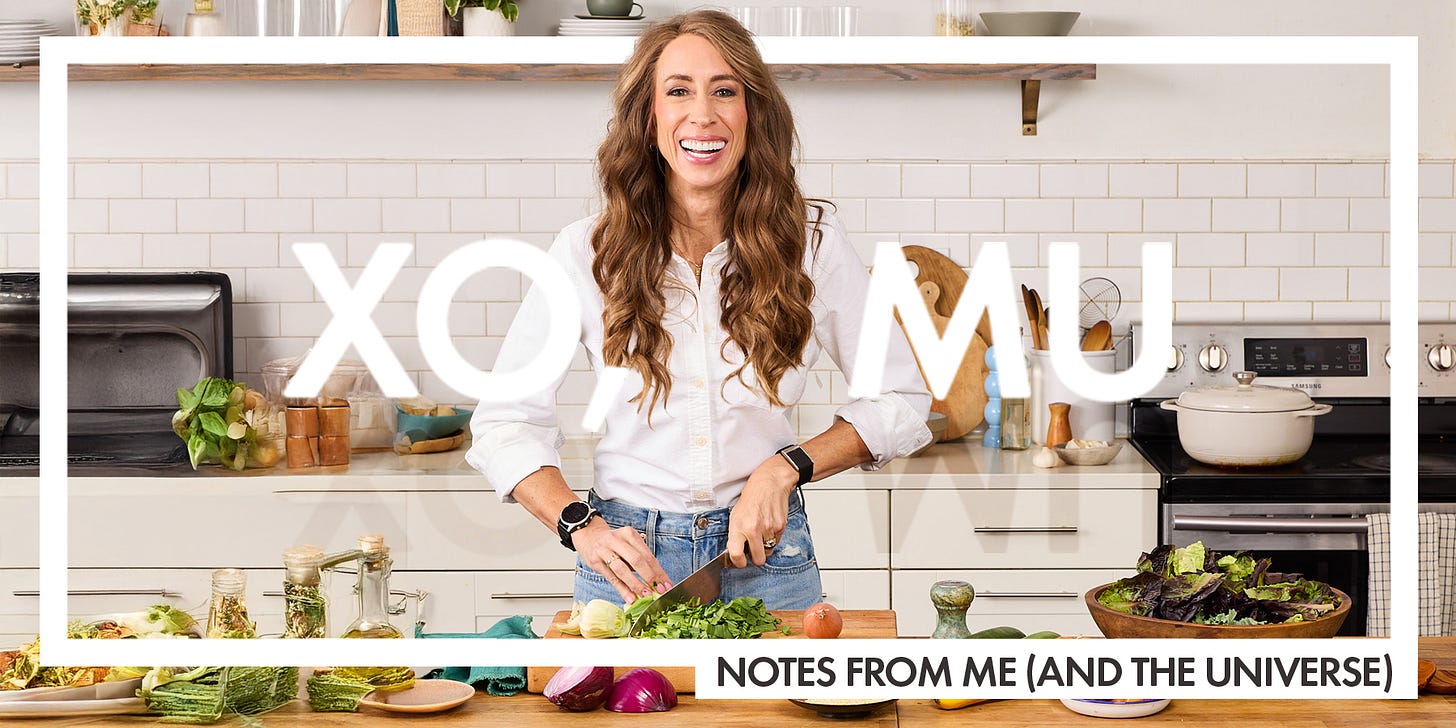I eat like a teenage boy when I'm home alone
A reader writes, "When my husband's out of town, my healthy eating goes out the window—and I don't like how it makes me feel."
My whole life (and this issue) is supported by the new DAILY BAR from Kreatures of Habit. It’s got 20g of protein, provides one-third of your daily fiber, includes creatine to support energy, activity, and focus. It also tastes like it coulda been made by Reese’s, if Reese’s had just 1 gram of added sugar. I’ve stashed one everywhere—my gym bag, carry-on, purse, kid’s lunchbox, car, and pantry. (Okay, I’ve got two boxes there—one Peanut Butter, one Cookie Dough.) Take 20% off your first order of the DAILY BAR with the code MELISSADAILY.
Liz from San Francisco sent me an Instagram DM:
“My husband is away for work often, and being home alone sends my normal meals and schedule right out the window. If it was one night, this could be fun! But my husband is gone for a week at a time, and by Wednesday I am not having fun. I feel guilty, anxious, bloated, and stuck in a shame spiral. Why is it so much harder when I’m home by myself, and what can I do?”
Liz, YOU ARE NOT ALONE. Being alone changes our routines, our rhythms, and the way we take care of ourselves. When the environment shifts, our patterns shift too. Being alone can also bring unmet needs to the surface. Food is one of the fastest, most accessible ways we try to meet those needs. We’re biologically wired for comfort and safety, and being home alone can feel neither comfortable nor safe.
Many of us (at least, to some degree) change our eating habits when we are suddenly alone—myself included. That isn’t inherently problematic. In fact, it’s normal! It makes sense to put in less effort, cooking for one. Of course you’d want to pull out your favorite chocolate bar and not have to share. I’d also want to eat ice cream in bed—how decadent and cozy!
Where it starts to feel not good is when you judge, criticize, or shame yourself for any of this. And at some point, it doesn’t physically feels good. Let’s unpack four things that may be contributing here. I’ll also share tips to help you remove the guilt, shame, and anxiety around food when you’re home alone.
1. The sneaky effects of a diet mindset
You may find yourself gravitating towards certain foods (like sweets, chips, soda, or wine) because we’ve all absorbed years of the “diet mindset.” You’ve been told that certain foods are “bad,” and you’re being “bad” or “naughty” when you eat them. We’ve internalized the false and harmful belief that being smaller is healthier, or at least better. And it’s practically gospel that some foods (often the foods we crave the most) are more likely to make us bigger.
The diet mindset taught us to feel conflicted around foods that are meant to be pleasurable. We deprived ourselves of foods we loved, to avoid gaining weight or being judged. And for many, it drove us to eat these foods quietly, in secret. A lifetime of messaging is hard to erase, and this could certainly be influencing your time alone.
Action Item
The Whole30 has been incredibly successful in helping people shed the diet mindset. The program removes all morality from food; doesn’t restrict calories, macros, or meals; and teaches you how to use your learnings to create your own personalized, joyful, sustainable diet. However, there are other practices that can help you reframe your relationship with food. Intuitive eating, mindful eating, and cognitive behavioral therapy could be helpful. A trained therapist or counselor can help you work through these beliefs and concerns as well.
A mantra that works here: “If it’s worth it, it’s worth it, and I deserve to enjoy it.”
2. Home alone (like the movie)
There’s something about being home alone (or traveling alone) that can make us feel like a 12-year-old left without a babysitter for the very first time. It’s exciting! No one is watching! You can do anything you want! You can have popcorn and wine for dinner or eat cupcakes in bed while watching Love is Blind and NO ONE WILL JUDGE YOU.
If you’re an introvert, or you’ve been living with someone for a long time, having the house to yourself can also feel like a celebration. And how do we celebrate? With food and drink! (Probably not Smoky Sweet Potato Chili; it probably feels more like a popcorn and wine event.) When combined with other factors, this can turn into a party that just doesn’t stop until you feel bloated, tired, and frustrated.
Action Item
There are plenty of ways you can enjoy the house and celebrate your solitude. Make a list! Walk around in your underwear, your robe, or maybe even naked. Take a long, uninterrupted bath, and use all the hot water. Cook a fancy dinner or get your favorite take-out and eat in a leisurely fashion. Use the incense your spouse hates, turn off all the big lights, sleep with the dog, go to bed at 7:30 PM, stick your nose in a book over dinner, play your music as loud as you want, or leave the TV on all day for background noise. Food can absolutely be part of your celebration, but it doesn’t have to be the main event. You have so many options!
A mantra that works here: “I’m going to celebrate in a different way every day.”
3. Stress, loneliness, and anxiety
Often, being home alone brings about stress. Maybe you’re solo-parenting while your spouse is gone, or taking on more pet-care or household responsibilities. You may feel lonely, missing the companionship. Or maybe being home alone is scary, leaving you sleeping poorly and feeling generally anxious. It can also throw you off your normal routine, which for some can feel unsettling.
It’s biologically normal to see an increase in cravings when you’re under stress. This is especially true if the stress of being home alone is on top of chronic stress (like financial concerns, lack of sleep, job pressures, or relationship challenges). Reaching for food when you’re overwhelmed isn’t a failure of discipline, it’s a built-in coping strategy. Your brain is trying to help you feel better with the tools at hand, and food and drink are easy and accessible.
Action Item
Think about your less helpful eating patterns when you’re home alone. Are they tied to a particular emotion, like feeling overwhelmed or anxious? Do they tend to happen at a certain time of day, like in the evening, when you’re usually spending time with your spouse? Do you snack more when you’re in bed, because you can’t fall asleep? Getting curious about the when, where, and why can unearth valuable insights. Those insights can help you find other ways to feel secure, comforted, and cared for during his trips. Get a home alarm system for security. Invite a friend over for dinner. Use paper plates. Order take-out (that still makes you feel good). Maintain your routines, if they feel comforting. Commit to no screens before bed, and read a book instead. Again, make a list!
A mantra that works here: “I have many tools for managing stress.”
4. The “it’s just me” mentality
It’s certainly more cumbersome to prepare tasty, home-cooked meals for just one person. Without anyone else to cook for (or eat with), it can be hard to motivate yourself to meal plan, prep, cook, and clean. That may lead to, “I’ll just get a pizza and some ice cream.” If you’re the primary home cook, it can also feel like a relief to take a break! Hot dogs, leftover veggies, and Ranch dressing may sound just right for dinner one night, but that inertia can quickly spin into “I don’t have much left, so I’ll just have (fill in pantry snacks).”
Even if you want to cook more meals for yourself, it can feel more time-consuming or cumbersome to cook for one. Without a plan and some reasonable accommodations, it’s easy to gravitate towards whatever is quick, easy, and rewarding. This is perhaps the easiest challenge to address, because a little planning will go a long way.
Action Item
Create a plan—but make it realistic. Cook some freezer meals ahead of time for easy reheating. Order some Made By Whole30 meals for delivery. Pull some favorite familiar recipes from a cookbook—ideally meals you can double for leftovers, or cook effortlessly in a slow cooker. Buy ingredients (like a rotisserie chicken, pre-cooked veggies, and a dressing or sauce) to throw dinner together in a jiffy. Hit your local grocery store hot bar for protein and veggies. Make it easy to keep eating foods that make you feel good, while letting yourself be more relaxed in the process.
A mantra that works here: “I’m can do the least and still eat meals that make me feel good.”
Food freedom is a practice
If you can relate to Liz’s question, don’t beat yourself up. It’s normal to feel unsettled when your patterns change. This isn’t about getting it “right.” There is no “perfect” Food Freedom plan. You’re encouraged to experiment, reflect, and change course as you figure out how to support yourself when you’re on your own. There are no “mistakes” in food freedom—only information. Every experience is a learning opportunity. Every “Well, that wasn’t worth it” helps to inform your next “home alone” plan.
On that note, if cupcakes in bed were worth it, lick your fingers and revel in it! If popcorn-and-wine-for-dinner was the tiny rebellion you needed, celebrate every kernel. But if you find yourself halfway through the week thinking, “This isn’t actually fun, and I don’t feel great,” you’ve got plenty of strategies—none of which require shame, blame, or punishing yourself for your choices.
Practice these awareness exercises the next time you’re about to be home alone. Talk strategies with a friend. Write your lists. Make a (gentle) plan. The more you practice creating new routines, meal plans, stress management techniques, and healthy habits when you’re on your own, the easier it becomes to care for yourself in a way that truly fills you up.
Oh, and I highly recommend instituting a “no pants needed” rule first. Just sayin’.





This is a great read with so many takeaways! Thank you!❤️❤️